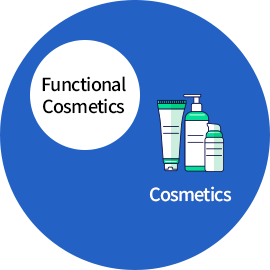
A cosmetic product refers to an item with less efficacy applied to human body by rubbing, spraying or other similar means in order to keep the body clean and beautiful making brighter looks and maintaining or enhancing the health of the skin and hair. However, those items listed on the Clause 2.4 of the Pharmaceutical Affairs Act are not included.
A functional cosmetic product is defined as the product to whiten the skin or facilitate whitening effects, facilitate the wrinkle improvement, tan the skin smoothly or facilitate skin protection from UV light (Clause 2.2 of the Pharmaceutical Affairs Act).
Enforcement Rule of the Cosmetics Act [Table 1] Quality Control Criteria (Clause 7) The quality control is exercised in order to ensure the product quality for manufacture and sales of cosmetics and such control includes control and supervision activities by a cosmetic manufacturer or other parties involved in manufacturing (covering inspection or testing activities), shipping control of such cosmetics and other quality control activities for cosmetics.
Protecting cosmetics in the market from hazardous materials!
Korea Pharmaceutical Traders Association (KPTA) performs EDI, training for personnel responsible for manufacture and sales of cosmetics, and bioequivalence testing for parallel imported cosmetics and its affiliated Drug Test Laboratory, in connection with the EDI system of the KPTA, established a convenient and simple operational system to provide one-stop services for the quality inspection of cosmetics.
is a cosmetics inspection body indicated by Clause 6 in the Enforcement Rule of the Cosmetics Act and continues to provide quality inspections for cosmetics in the market and client specific solutions based on its accumulated technical competence, experienced experts and high-tech equipment.